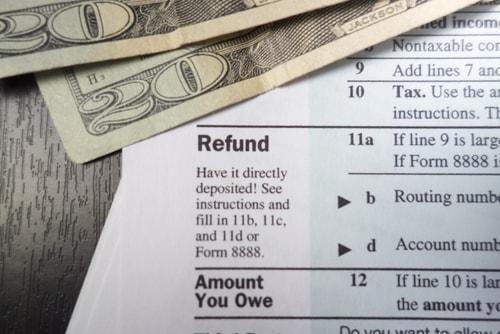Dividing a Tax Refund Following a Divorce
 If you completed the process of divorce last year, filing your income taxes this year has probably raised a number of questions. (If you have not yet filed, the deadline for personal income tax returns is fast approaching. Presuming your divorce finalized on or before December 31, 2016, you almost certainly filed this year’s taxes as a single filer. Many single filers still end up receiving a refund for overpaid taxes, but if you have recently divorced, you may not be entitled to keep your entire refund for yourself.
If you completed the process of divorce last year, filing your income taxes this year has probably raised a number of questions. (If you have not yet filed, the deadline for personal income tax returns is fast approaching. Presuming your divorce finalized on or before December 31, 2016, you almost certainly filed this year’s taxes as a single filer. Many single filers still end up receiving a refund for overpaid taxes, but if you have recently divorced, you may not be entitled to keep your entire refund for yourself.
A Tax Refund Is Not New Income
In an Illinois divorce proceeding, a couple’s marital property must be divided equitably between the spouses. Marital property, in general, refers to all assets and debts acquired by each spouse during the marriage, with a few limited exceptions. All other property, including that acquired before the marriage or after the divorce finalizes, is considered non-marital or separate property.
Assuming your divorce judgment was entered last year, it would seem logical to believe that money coming in the form of this year’s tax refund would be separate property and, therefore, should be yours to keep. Illinois courts, however, see things a little differently. Your tax refund, technically, is money that you earned during the last tax year that was withheld to cover your tax liabilities. If you are receiving a refund, it means more money was set aside than was needed, but it is still money that was earned last year. This means that a portion of your refund could be considered marital property, depending on when your divorce actually finalized.
If you were legally married until the end of December, your entire refund is likely to be marital property. By comparison, if your divorce finalized in late June, only about half would be subject to division.
Tax Refund Considerations
Many divorcing spouses address the next year’s tax refund in their marital settlement agreement. In some situations—especially if both spouses earn similar incomes or one spouse is claiming the children—each party will simply keep his or her respective refund. In others, however, an equitable split of the refund may be necessary. If you are unsure whether the matter was covered in your settlement agreement, it is important to find out before you make a potentially costly mistake.
Financial concerns are often among the most challenging aspects of any divorce. If you have questions about dividing marital property, tax considerations, or any other divorce-related topic, contact an experienced DuPage County divorce attorney. Call 630-409-8184 for a confidential consultation today
Sources:
http://www.illinoiscourts.gov/Opinions/AppellateCourt/2016/3rdDistrict/3150710.pdf

 630-409-8184
630-409-8184













